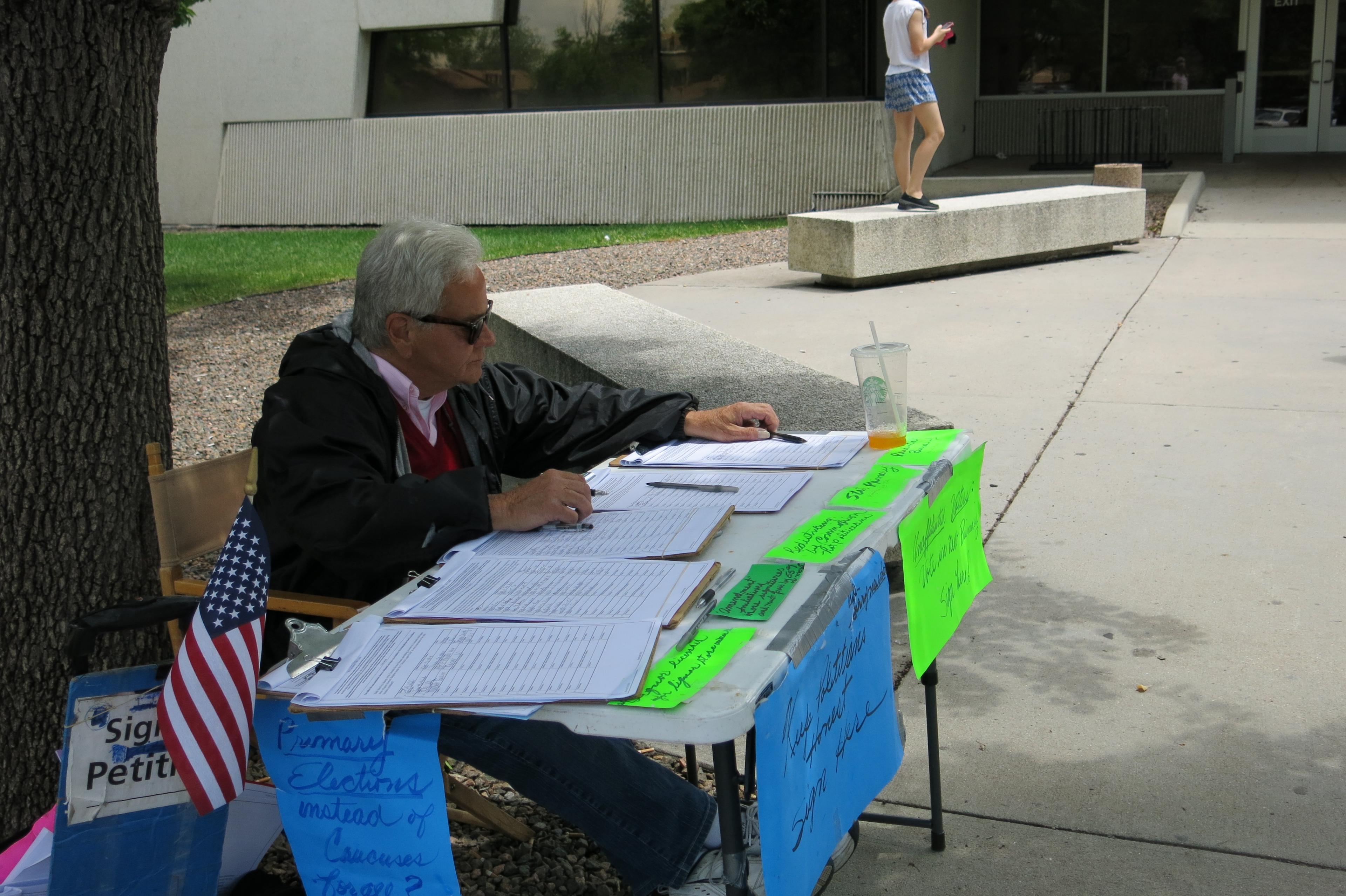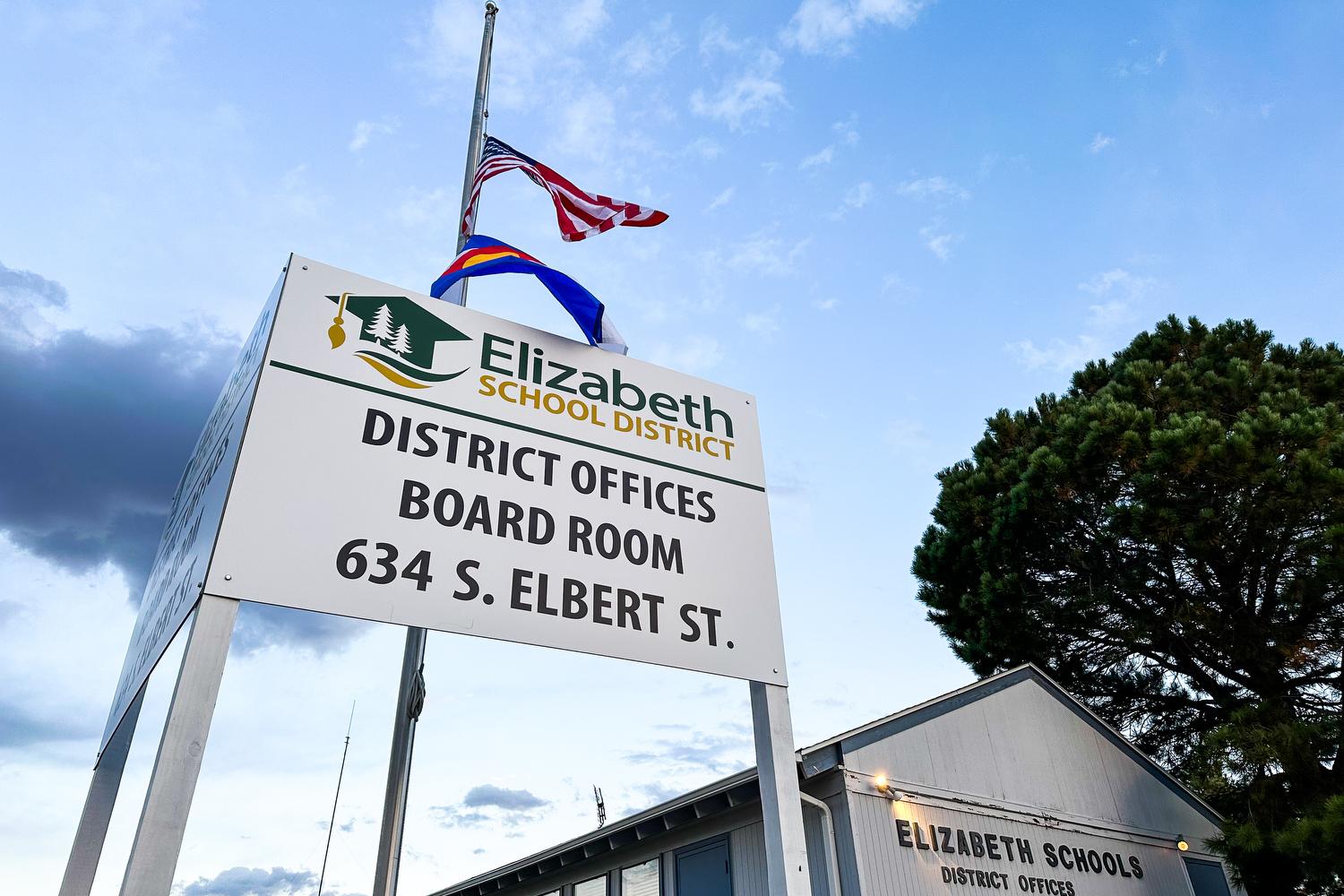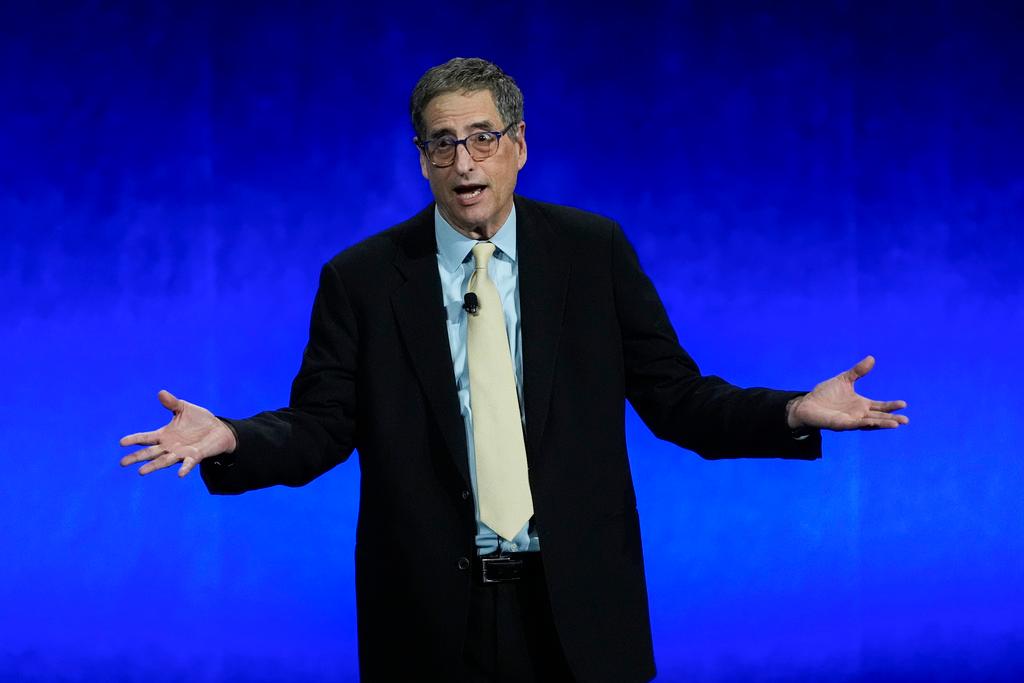
Among the questions on Colorado's fall ballot is one that raises the requirements to amend the state constitution. Under Amendment 71, organizers of constitutional ballot initiatives would have to gather signatures from 2 percent of voters in each of Colorado's 35 state senate districts. The proposal also requires constitutional amendments to be approved by 55 percent of voters, as opposed to a simple majority.
Former state Senate Minority Leader Josh Penry, a Republican, backs the measure. Elena Nunez of Colorado Common Cause opposes it. They spoke with Colorado Matters host Ryan Warner.
Read a transcript:
Ryan Warner: This is Colorado Matters from CPR News. I'm Ryan Warner. Should it be tougher to amend the state constitution? Voters will answer that question this election by voting on a proposed amendment to the constitution. Amendment 71 would raise the bar as proponents frame it. The fight over this has gotten intense to say the least and we're going to debate the measure today. Josh Penry is a former Republican State Senate minority leader and a supporter. And Elena Nunez is an opponent. She's with Colorado Common Cause. Welcome to both of you. Elena Nunez: Good morning. Thank you for having us. Josh Penry: Thanks for having us. RW: So Josh, before we get into the mechanics, big picture question for you, why should it be harder to amend the state constitution? JP: Well Colorado has one of the easiest constitutions in the United States to amend, in fact the easiest. And a constitution exists to protect core rights and values and those rights and values shouldn't be easily taken away. And because of the easiness and ease of which you can amend the constitution, our constitution has many editorial pages that have endorsed Amendment 71 have put it, has kind of become this dumping ground for special interest groups to push fads and trends and gimmicks and all sorts of other things. And so our proposal is a simple, a simple one, it just says that it should be more difficult to amend the constitution. If you want to change the state's foundational document, you should demonstrate some support across the state of Colorado. RW: Okay. And explain how that would work and how it differs from the process today of putting an amendment on the ballot. JP: Colorado is one of the few states where through the citizens initiatives process the rules for amending statutes, simple statutes are the same as amending the constitution. So what happens is groups, all things being equal, cost is the same, effort is the same. They're putting the bulk of their proposals trying to get them into the constitution where something is essentially forever. And so what our proposal does is differentiate the constitutional amendments from statutes. The rules for changing statues won't change. But to change the constitution, you'd have to collect signatures across the state. There is no such requirement now and groups have a tendency to collect signatures only in Denver and Boulder. And the second requirement is that in order for it to be adopted and put in the constitution, you have to win a 55 percent of the vote. RW: That is versus a simple majority now. And you talk about gathering signatures before something is put on the ballot all over the state. You'd have to get essentially two percent of registered voters from each of the state's 35 senate districts. Is that correct? JP: That's correct. And that's the way, these geographic requirements are common in the bulk of other initiative states and the senate districts is a jurisdictional boundary that ensures really if you want to change the constitution, you are going to have to go into the four corners and all the communities of the state and give them some nominal stand in the process. Again it's about 1500 or 2000 signatures. So hardly a significant haul. RW: Okay. The signatures have to do with getting something on the ballot. And then once it's on the ballot and you want to amend the constitution it has to have 55 percent support. How did you settle on that number? JP: It's kind of a pragmatic approach. A number of other states require 60 percent or two-thirds votes. There's a couple of states that actually require a simple majority but it has to pass in two consecutive elections. And 55 percent is sort of, it's not as onerous or difficult as those ones, but it's a higher bar than sort of the 50 percent plus one threshold. Governor Hickenlooper who is a strong support over it, puts it well, like you don’t want sort of the fad of the moment to be in the constitution forever. And this 55 percent requirement is a way to ensure that these are sort of broader based, broader supported concepts and principles that actually have a place in the constitution again, rather than a simple fad. RW: A bit of a nuance here. If voters wish to change the constitution by amending something that's already there, so changing an existing amendment, or let's say repealing an amendment altogether that's in the constitution, is there a different bar to meet? JP: There is. There's a whole lot of stuff in the constitution, there are now more than 150 amendments, again because Colorado's constitution is so easy to amend. So the decision was made as to make this prospective, is to keep sort of the next, to raise the bar on the next proposal that comes along. And if you wanted, so if you wanted to change the things that are in the constitution, you could do it from a vote perspective under the same rules as when they were adopted so that's a 50 percent plus one. And so there are things that the right loves, the conservative loves in the constitution, TABOR comes to mind. There are things that, more progressive groups like, Amendment 23, Marijuana Legalization. The decision was made. We're not going to fight about that. Those can be changed, altered or modified under the same terms as they were adopted. But this is really about protecting the constitution going forward from future special interest onslaughts, which every cycle we see. RW: All right. That's a picture of what Amendment 71 would do and let's bring in an opposing voice, Elena Nunez of Colorado Common Cause. You've heard Josh Penry describe the state constitution as a dumping ground, perhaps a place for the fad of the moment. Is that how you see the state constitution? EN: No, I would respectfully disagree. And I think it's important to realize that of the 150 amendments to the Colorado constitution, fewer than fifty were actually proposed by the voters. The vast majority of changes are proposed by the legislature. So the idea that the constitution is easy to change or a dumping ground is insulting to the voters of Colorado. But I want to address something that Josh just said because I think it's important for voters to understand. It's actually not true that you can change existing language in the constitution under the current rules. If you want to put one word into the constitution, so anything other than a repeal, you need to meet the new vote requirements that it would be established under Amendment 71. So if there were a proposal for example to address TABOR and Amendment 23 that did anything other than repeal provisions, it would need to not only get the signature requirements, it would need to meet the super majority vote. So what that means is that if Amendment 71 is adopted we'll be fossilizing the existing provisions of the constitution as they are right now because it will be so difficult to change them moving forward. RW: Josh, what do you say? JP: That's just not factual. It's interesting there's sort of an alphabet soup of interest groups who have proposed this effort and all efforts to make it more difficult to amend the constitution in its varying degrees through the years. You have groups on the right that say that this is sort of rolls out the red carpet to repeal TABOR. You have groups on the left saying that it fossilizes TABOR and the constitution. The truth is it doesn't either of them. TABOR specifically, you can actually, under its own terms, “de-Bruce” [a reference to Doug Bruce, the TABOR amendment’s sponsor] TABOR’s the state and all the revenues and keep the government, could through a statutory change, Referendum C, the de-Brucing effort of about a decade ago was a statutory measure. And so a lot of this is hyperbole. There are, I think good people but, and good, generally sort of they have their own sort of ideological bent and their own perspective but they use the constitution for their own agenda. And so the point is if the groups want to continue to put things in the constitution, there is still a very clear process and it is not as difficult as other states where you require 60 percent of the vote or where there's three times as many signatures required. But we are saying, you know if you want to do it, you need to demonstrate a little bit more support. And if you donít like the new rules, you can always change state statute under the rules as today. And that's the way it should be. It should be more difficult to amend the constitution. RW: Yeah, in some ways you are incentivizing the changing of statute over the changing of the state constitution. Let's get to more of your opposition, Elena. So I understand that you have concerns around the geographic requirement for signatures. So again, having to gather a certain percentage of signatures from each of the state Senate districts. EN: Yes. And I think it's important to realize that Colorado actually has a difficult process already. If you compare the requirements in Colorado to other states, although the number of signatures vary, in Colorado because we only have 180 days to gather signatures, the, it's actually more difficult to gather signatures in Colorado than in the vast majority of other states that allow us to amend the constitution. RW: You're saying that's because of the time factor? EN: Yes. So the number of signatures you need to get per day is actually harder in Colorado than all but five other states. But then when we actually look at the proposal for Amendment 71, it would allow one Senate district, so about three percent of the population to block a reform from making the ballot that's supported by the rest of the state. So unlike a lot of other states that have these types of requirements, where you need to get some portion of your signatures from some of the districts, this says every single district must meet the threshold and if you come up short in just one district, you won't make the ballot. So an issue with broad support throughout the state, if you are one signature short in one district, won't make the ballot. RW: On the subject of the geographic requirements for signatures and to follow along with me here, I'm going to bring in another issue because this election, anti-fracking groups failed to get enough signatures to put two ballot measures related to energy development in front of voters, they oppose Amendment 71 because they don’t want to make the process any harder. But oil and gas groups support it and in fact they've funded about half of the pro-campaign. They say of the signatures that were gathered for the anti-fracking measures, most came from Larimer, Boulder, and Denver counties. And the industry argues, there wasn't fair geographic distribution. Here is Karen Crummy spokeswoman for the oil and gas group, Protect Colorado. [plays recording] Karen Crummy: Weld County, Garfield County, you know the biggest oil and natural gas producers in the state, you know, I'm not even sure if any of the signatures came from there. RW: So Elena, you say that one state Senate district could sort of block an effort or an interest that had statewide support but another way to look at this is doesn't Amendment 71 force someone who wants to put something onto the constitution to get voices from all across the state, not just a concentrated number of counties that might not even be close to a particular issue, like fracking. EN: Well certainly if you want to advance a constitutional amendment it makes sense to go out and talk to voters throughout the state and I've never been part of a campaign that didn't do that. But what Amendment 71 does is set the bar so high that one single district, whether it's in Colorado Springs or Denver, could act as a gatekeeper and veto a proposal from moving forward simply by refusing to sign the petition. RW: So fundamentally you don't disagree with the idea that some other measure than this, if it were to force you to get signatures from a more diverse area, you would agree with that. But you think this is a little too stringent? EN: Well what I think is that it is good policy to have a conversation statewide. But I think setting a requirement that make it impossible for grassroots groups to gather signatures and make it impossible to advance issues and put the constitution out of reach is inappropriate. And I think the illustration that demonstrates this so well is the Amendment 71 proponents. They made an effort to gather signatures statewide, which is great. I've never been part of a campaign that hasn’t. But an analysis by Complete Colorado, an Independence Institute, found that they came up short in several districts. So if they were trying to follow their own rules and they were in place, they wouldn't have made the ballot and I think that demonstrates why this is so dangerous. RW: Josh Penry, indeed this analysis from the Independence Institute, which I should say takes a position on this, finds that you would not have met your own requirements. What do you say? JP: Well, it’s the Independence Institute, who — let’s just say the analysis was bogus. I’m happy to discuss more. We’ve discussed it at length. We went and we collected 185,000 signatures, [unclear] thousand outside the Denver metro area, a huge volume in all 35 state Senate districts and we learned something along the way; it actually is not that difficult. To Elena’s point that just one signature and one district could disqualify a ballot initiative, the immediate rebuttal is the one that you set up to her. There is already a defacto, sort of a strong man, strong woman, strong arm in this process, and that’s Boulder and Denver. You could go in and they control the process, but if you miss by one signature today, there has to be a line and you don’t qualify. The key is that this is not unusual or unprecedented or exceptional. Many, many states require some geographic distribution of the signatures in recognition of the fact that the constitution does in fact belong to the entire state. And it’s easy to say you’ve never been part of a campaign that hasn’t collected signatures. We went into these communities on the Eastern Plains and the San Luis Valley and the Western Slope; they had never seen this before, and that’s why actually, in some respects, that was the easiest signature to get because folks were so engaged and eager to be part of the process for the first time. RW: Why don’t we pick up this debate after a quick break? I’ll have you stick with us. We are speaking right now with both sides of the debate over Amendment 71, which has to do with how Coloradans amend their state constitution, and we’re speaking with former Republican State Senate minority leader Josh Penry from Raise the Bar, which supports Amendment 71, and Elena Nunez of Colorado Common Cause, which opposes this measure on your November ballot. Back in a moment on Colorado Matters from CPR News. RW: You’re back with Colorado Matters from CPR News. I’m Ryan Warner, and you know that on the program we have been debating many of the statewide ballot measures. On your ballot this November, today a debate over Amendment 71, the so-called ìRaise the Bar Initiative,î which would change how Coloradans change their state constitution. We are speaking on the pro side for Amendment 71 with former Republican State Senate minority leader Josh Penry, and against this Amendment 71, Elena Nunez of Colorado Common Cause. And Elena, Iíd like to have you address this super majority requirement so 55 percent of voters having to say yes to a proposed constitutional amendment. What do you make of that figure specifically? AN: Well, it’s contrary to the whole notion of majority rule, which is that if as a state, a majority of us believe something belongs in the constitution, we should be able to adopt it, and I think that in practice it will allow well-funded opposition campaigns to block measures that they don’t like by driving the vote total down. But I think if you go back and look at the history of Colorado, there are also examples of why having a majority requirement makes sense to amend the constitution. So in 1893, before we even had the citizens’ initiative process, there was a measure referred to the voters by the legislature, and that was to give women the right to vote, and that measure passed with 54.7 percent of the vote. Now, that’s a measure that I think we can all agree had enough support to belong in the constitution, a core right that is appropriate for the constitution, but if Amendment 71 had been in place then, we wouldn’t have seen it. And so I think it’s important to realize that majority rule is also an important element of governance because it allows us to take action when we need to, and the 55 percent threshold will block off future amendments and make it too difficult to address important issues. RW: Josh Penry, the question of women’s suffrage has been raised. How do you respond? JP: Well, we have a lot of really formidable women who are in support at the Colorado Women’s Chamber of Commerce and I think that, so, just sort of stretches the bounds of reasonableness, and we’ve seen a lot of things thrown out by the no side and that’s just sort of in part and parcel with it. RW: Well, but do they? I guess I’d like to have you address their fundamental point, which is that if this measure were in place at that time, women’s suffrage. JP: In the 1800s, yes, right. Well, I can’t go back and return myself to the late 1800s and to the state of mind but I suspect that things would have turned out well as they should. And the same argument, for example, is thrown out about term limits. Term limits wouldn’t have been put into effect if, because it passed with less than a 55 percent vote. But if you look at term limits, now it has about 85 percent of the vote. In the case of term limits, again nothing in this provision requires or prohibits or limits the ability to change simple statutes. So a lot of this is sort of scenario making and a lot of the things that are in the part of the reason, a big part of the impetus and the reason we have a lot of progressive and civil rights leaders are they want to protect rights that exist in the constitution from some of the battery of things that have been thrown out there. To the notion of majority rule, I mean when you look how the US Constitution is amended, two-thirds vote to the Congress, refer back to three-fourths of the states. State constitutions aplenty around the states essentially differentiate because there are two: we live in a constitutional system, both at the federal level and the state level. There is a role for our constitution and there is a role for the statute. Constitutions are effectively forever, and that’s not for speed limits or general operations of governments or sort of more mundane operational things. And what’s happened because we create the standard the same, we create an incentive for interest groups to slam things into the constitution; that’s why our constitution is the third-largest in the country. That’s why we have these conflicting mandates that push and pull and make it hard for the leaders of the state to do what they need to do to move the state forward. RW: So, Elena, your group, Common Cause, is often viewed as a liberal organization, but you have unlikely allies lined up against Amendment 71. Recently you appeared on the program Devil’s Advocate on Channel 12 on public television, hosted by John Caldera. And he’s the president of the Libertarian Independence Institute and opposes Amendment 71. You were also on with John Andrews, a republican who has served as state senator and is active in conservative causes and here’ s what Andrews says about Amendment 71. [plays recording] John Andrews: It would virtually close out “we the people” from a petition process that has brought these various reforms, some from the right, some from the left, into Colorado’s governing charter. A good friend of mine puts it succinctly: The laws are where the government tells the people what to do, but the constitution is where the people tell the government what to do. RW: Josh, we’re talking about issues that might not be popular with lawmakers, and Elena and other opponents say this makes it too tough to get these issues into the constitution. What do you say to this idea that an easier process of amending the state constitution is empowering to the people whose legislature might not be acting in their best interest? JP: Well, John Andrews, who is a friend, has a problem with James Madison. These issues were debated extensively in the framing of our United States Constitution and the same basic rationale applies here. And what he fails to miss is the obvious: why a constitution exists. It exists to protect rights, and when majorities, in the words of Madison and the Founding Fathers, when mob rule can rise up and take them on a whim in a moment of passion, the republic or the state is not safe and the people aren’t either. And so that is why, for example, to take it from the general to the very specific, you have farmers, the Ag community are broadly supportive of this measure because every few years you have groups funded by out-of-state interests who are interested in our water who want to undo our prior appropriation system which gives them water rights. Essentially the proposal is to take away their vested property rights through 50 percent plus one, and so that is illustrative of why a constitution in fact exists. It exists to protect rights. As Wellington Webb said in a really powerful TV ad, those rights should not be easily taken away by the whims of 50 percent plus 1. RW: Wellington Webb, former Denver mayor. Elena Nunez, what do you make of the fact, and correct me if I’m wrong, I think every living governor in Colorado is in support of Amendment 71. Doesn’t that carry a lot of water with you? AN: Well, it s not surprising that there are many political elites who want to see Amendment 71 in place, and that is because the reason we have an initiative process is for the people to address issues when their government wonit, either due to a lack of political will or a conflict of interest. And if you look at measures that are proposed, the reason that they are is because our elected officials are not acting. And Amendment 71 would take power away from the people and make it more difficult to hold government accountable. So no, it’s not surprising at all to see the politicians lined up in support of Amendment 71. RW: I mean, one argument against Amendment 71, and you’ve said something similar, is that it takes we the people out. Is that a bit of an extreme argument? Doesn’t it just mean that we the people have to meet a slightly higher bar? AN: Well, I think the bar is much more than slightly raised under Amendment 71. The signature requirements alone will make it prohibitively expensive, probably two to three times the cost of a current campaign, to put something on the ballot. And again, the super majority vote requirement gives more power to opposition interests to spend money trying to reduce the vote total. RW: Where do you get that figure, that it’s going to be that much more expensive? What we heard from Josh Penry earlier is their effort to try to sort of adhere to their own rules on this and finding it’s not as difficult as it might seem. AN: Well, a few things. One, their campaign spent nearly a million dollars gathering signatures, which is more than the average campaign under the current rules, and they came up short. But having run petition drives in the past, I know that if you have to gather signatures in 35 Senate districts, you need to make sure that you have enough in every district, which means having a significant operation to both gather the signatures, verify the signatures and make sure that you don’t come up short in any district, and that’s just going to require a lot more time and money and infrastructure, and that costs money. So what weíre going to see is if you are an incredibly well-funded interest, you may be able to make Amendment 71 work; you may not, but you can try. But if you are a less well-funded campaign, you’re not going to be able to do it. RW: Josh Penry, address that concern for me. So your campaign has benefited from some of the transfer, if you will, from the oil and gas industry that’s given you some deeper pockets. Does this quiet the voice of the little guy or gal? RW: Well, there’s a couple of unifying factors to the opposition you mentioned, the strained bedfellows that are opposing it, groups on the right and the left. All of them have a couple of things in common. Virtually all of them have a Denver or Boulder zip code and virtually all of them run ballot initiatives and use ballot initiatives as organizations to raise money and consolidate political power, and all of them have huge financial backing from large individuals. Elena’s organization, Common Cause, pushed a ballot initiative a few years ago funded by Jared Polis, who’s worth several hundred million dollars. So the notion that and on the other side is John Andrews and folks like Bob Beauprez and Jon Caldara, sort of the embodiment of the establishment. Good people, but sort of spare me the notion that the no side is not the establishment. In terms of financial support, we do have support from a lot of industries that have been targeted by some of these more insidious ballot initiatives, the attempts to ban fracking, health care industries, doctors, nurses are big supporters because of the single-payer proposals. But you also have groups like the American Association of Retired People (AARP), and small rural chambers of congress all across the state who are tired of sort of the whims of Denver and Boulder running roughshod over their priorities and over their values. And so, the coalition on our side is a diverse one and it really is a lot of small voices, rural leaders who just feel disempowered by the status quo. RW: Josh Penry, very briefly, if Amendment 71 were to pass and did so with less than 55 percent majority, how would that make you feel? JP: Well, we’re doing everything in our power to ensure that is not the case, but that wouldn’t change the fundamentals, which is the policy does make sense. A constitution exists to protect basic rights, important values and those rights and values shouldn’t be lightly taken away by the whims of the hour. RW: Elena, in about ten seconds, give us your final thoughts. AN: Amendment 71 is an attempt to take the constitution and put it off limits to all but the wealthiest special interests. Vote no. RW: Thanks to both of you for being with us. You heard there from Elena Nunez. She is with Colorado Common Cause and opposes Amendment 71 on your November ballot, and Josh Penry, who is with the pro campaign Raise the Bar. |
Related:









